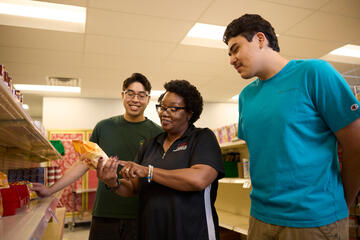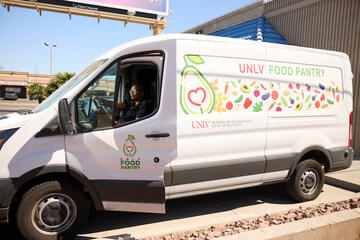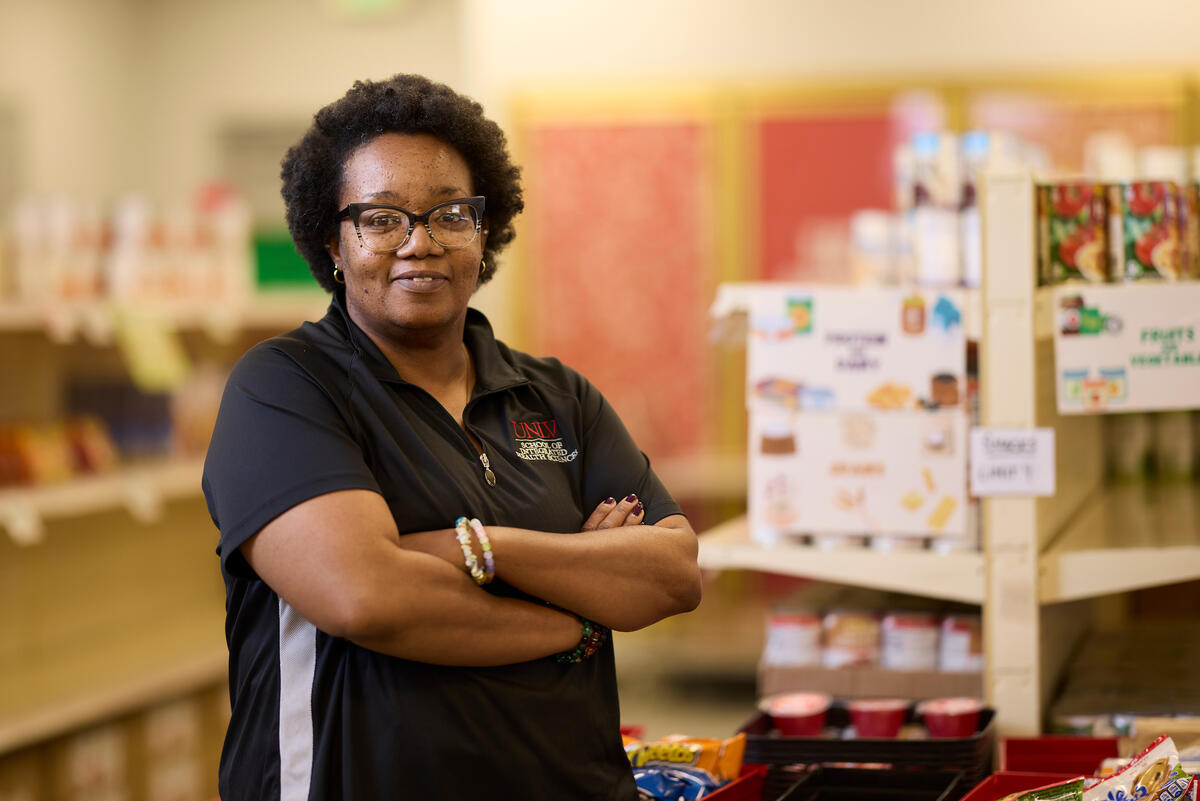A decade ago, Carmen Johnson had been laid off from her job in Waterloo, Iowa. Pursuing potential job leads often meant a two-hour drive to Des Moines but she was determined to provide for her three young daughters.
“I was on unemployment and supplies were running low, so I would take them to day care or school early in the morning, hop in the van, and make that drive,” she said. “But you do what you have to do.”
Shortly before moving to Las Vegas in 2020, Johnson was working three jobs but still needed to use her local food pantry’s services to feed her family. She felt a sense of guilt; a quasi-obligation to explain to the employees and volunteers working there why she needed to use the food pantry so badly.
“I’ve just always hated taking things from other people. It made me feel guilty,” she said. “It was the notion of taking things from other people, no matter what it was or what it was for, that I’ve never liked. I’ve always been very independent, so it was tough to experience.”

As coordinator of the UNLV Food Pantry, she recognizes in others the same stigma that she once felt using the food pantries in Iowa. She understands how they feel, what they’ve experienced, and approaches them with the same empathy and understanding that she received.
“A lot of people try to explain themselves about why they have to use the food pantry, but I assure them that it’s OK. They don’t need to explain anything to us. That’s why we’re here,” she said.
“[The UNLV Food Pantry] is far beyond any food pantry I’ve ever been to or have worked at. We educate our visitors about nutrition and how to both live better and eat better. It takes me back to gardening life and the time I spent with my great-grandmother. I think we do a good job of helping them thrive here at UNLV.”
An Upbringing That Encouraged Service to Others
Growing up in Iowa, it was her great-grandparents’ influence that shaped her life’s calling to serve others.
Her great-grandparents owned a chunk of land in Waterloo. Her great-grandmother ingrained within her the importance of a healthy lifestyle; tending a garden redolent of fresh fruits, vegetables, and beans that could later be found simmering in a big pot in their kitchen.
Her great-grandfather, she said, maintained an entrepreneurial spirit that had him loading up and hauling scraps of metal in his big truck and then driving it all back home to make tables, desks, and anything else that could be of use.
Whenever his glasses broke, he would mend them with pieces of tape or a band-aid, a quick remedy for a generation that fixed what needed to be fixed rather than buying something new — especially something considered a luxury like a pair of glasses.
When Johnson wasn’t at school or spending time with her great-grandparents, she went to work with her mother, who held myriad jobs — a restaurant, a position within the local school system, and in group homes taking care of people with disabilities.
As she got older, Johnson worked her own assortment of social work jobs assisting various populations, including the hungry and the formerly incarcerated. She used each experience to better prepare herself for the next one.
“Social work isn’t a career I chose. It is who I am. I’m a natural advocate with compassion and a wanting to connect people,” she said. “Just utilize everything you can to make things work. As a social worker, you have to fill in the gaps. I had to be self-reliant like my great-grandfather and nurturing like my great-grandmother.”
Johnson had never been to the West, let alone Las Vegas, when she packed up her home and her daughters and came to Southern Nevada after her oldest daughter was accepted into UNLV’s College of Fine Arts.
“My daughter had also been accepted into schools in California and Arizona, but we decided to come to Las Vegas,” she said. “I like to call it ‘divine intervention.’”
Growing the Food Pantry
Johnson assumed the role of UNLV’s Food Pantry coordinator, managed by the School of Integrated Health Sciences, in November 2022. Since making Southern Nevada her new home, she has grown the food pantry’s usage with support from donors and local grocery stores, and by providing a warm and nurturing environment to the campus community.
From April to December 2023, the UNLV Food Pantry served 2,747 people representing 8,202 household members — a more than 13% and 18% respective increase from the same time frame the previous year.
Chris Acosta, a nutrition sciences major in the department of Kinesiology and Nutrition Sciences within the School of Integrated Health Sciences, began volunteering at UNLV’s Food Pantry in November 2021 and became a student worker a few months later.
Since Johnson has been the head of the pantry, he’s seen just how much she’s meant to the student workers and those who visit the pantry consistently.
“Carmen recognizes that there is a stigma attached to getting help from a food pantry. She wants the pantry to be a place where individuals feel comfortable to receive help as much as they need,” he said. “She recognizes the impact that food insecurity has within the UNLV community and is continually thinking of ways to combat the issue.”
Thanks to a generous partnership involving UNLV, Three Square food bank, and the Molasky family, the food pantry now has a van big enough to transport many more healthy food options from local grocery stores. Johnson can be seen pulling the van into the food pantry’s parking lot a few times a week and unloading the abundance of items to fill the shelves and coolers inside.

After the Dec. 6 campus shooting closed all on-campus dining options through winter break, the food pantry remained open by appointment only and saw a drastic increase in visitors.
“It is our obligation to show compassion to the UNLV community,” Johnson said. “Whether it’s food, a smile, or a kind word — we want to show the campus that we care and that we are here for them.”
Ronald Brown, dean of UNLV’s School of Integrated Health Sciences, credited Johnson for her steadfastness to making the campus community stronger and for her welcoming demeanor all in the name of service.
“Carmen is the epitome of what every person should be in terms of service and an ongoing commitment to social justice and taking care of others,” Brown said. “From the cornfields of Iowa, Carmen has become a magnet of good for UNLV. There is no more caring person you will find on this campus than Carmen Johnson.”
Johnson is proud of the work the food pantry has done for UNLV and remains encouraged by its leadership, including UNLV President Keith E. Whitfield, who has gifted thousands of dollars to the Food Pantry.
“It’s nice to know that feeling of support is already here. Staff, students, faculty. Everybody who comes here is the same,” Johnson said. “There’s no hierarchy here. It’s all about building support and relationships.”
Johnson’s great-grandparents have long since passed; both on April 21: Her great-grandfather in 1993 and her great-grandmother in 2002. Still, their memories are unwavering in her mind.
After she earned her master’s degree in social work in 2022, Johnson finally feels, due in large part to her great-grandparents’ influence, that she is blossoming into the person she was always meant to be.
“Human connection makes it so rewarding to have this career path, and that translates to the work we do here at the UNLV Food Pantry,” Johnson said. “When they come to the door, it's good for them to have someone they can connect with."



